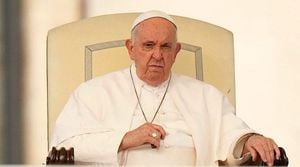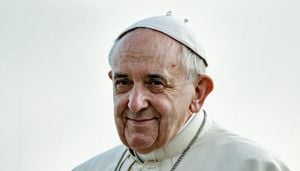On February 21, 2025, International Mother Language Day was celebrated around the world, highlighting the importance of linguistic diversity and its role as a tool for peace and cultural expression. The events particularly held emotional significance in Dhaka, Bangladesh, where hundreds of thousands gathered to honor the activists of the language movement who sacrificed their lives for the recognition of their mother tongue back on February 21, 1952.
The Central Shaheed Minar, the martyrs' memorial dedicated to those who lost their lives during the language protests, was adorned with flowers, as children and families participated in memorial programs throughout Dhaka. These observances remind people not only of the historical struggle for linguistic rights but also the value of preserving languages worldwide.
This year marks the 25th anniversary of International Mother Language Day, first established by UNESCO to promote linguistic and cultural diversity as foundations for peace. According to UNESCO, "Linguistic diversity is a fundamental element of cultural diversity," which underlines efforts the organization has taken through its International Fund for Cultural Diversity (IFCD).
The IFCD has become instrumental in funding projects worldwide to support multilingualism and to protect languages at risk of extinction. Recent initiatives have emphasized children’s literature ecosystems, such as those established in Ethiopia, and have supported cultural policies concerning minority-language publishing industries across countries like Haiti, Kenya, Nigeria, and Serbia.
Another noteworthy project funded by the IFCD was the establishment of multilingual reference libraries through Tunisia’s National Centre for Translation. This not only produced valuable resources for the preservation of language diversity but also aimed to improve linguistic skills among students, thereby enhancing job opportunities for young individuals moving forward.
UNESCO also facilitated knowledge sharing among countries through its Policy Monitoring Platform. For example, the Zimbabwe Broadcasting Corporation received US$200,000 to recruit language personnel to provide news broadcasts in nine marginalized national languages. Likewise, the National Library of Norway created a language bank to support innovation based on the Norwegian and Sami languages, responding to the rising demand for language technology products.
Australia’s National Library, collaborating with the Australian Institute of Aboriginal and Torres Strait Islander Studies, recently adopted new coding systems to empower over 70 libraries facilitating accessibility for indigenous cultures and languages—an initiative which has significantly enhanced engagement with Australia’s rich linguistic heritage.
International Mother Language Day 2025 also coincides with the celebration of the 20th anniversary of the Convention on the Diversity of Cultural Expressions, reinforcing the long-term commitment from countries and organizations to preserving the diversity of languages.
Through these observances and initiatives, the shared hope remains steadfast—a global community united by respect for diverse languages as instruments of peace, unity, and cultural richness. Each pledge made and each initiative launched stands as a tribute to the myriad languages, alongside their rich histories, cultural narratives, and the communities who cherish them.



